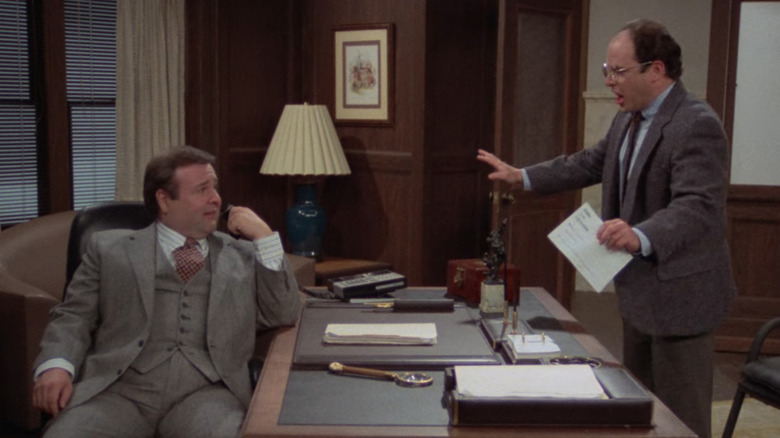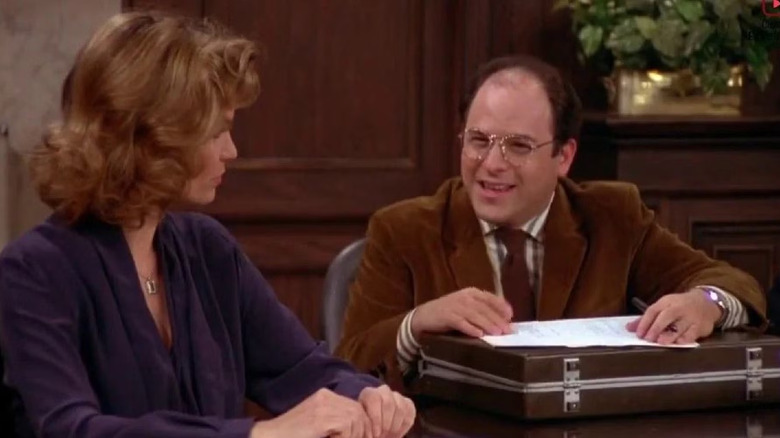The Real-Life Influence Behind George Costanza's Quitting Job Bit On Seinfeld
In the "Seinfeld" episode "The Revenge" (April 18, 1991), George (Jason Alexander) has become fed up with his boring office job and wants to quit. Specifically, George is outraged by the fact that he was barred access to his company's executive washroom. He storms into his boss' office early in the episode and goes on a wrathful tirade about how his boss, Mr. Levitan (Fred Applegate), is a talentless hack and that he has no thoughts in his head. George yells, "I quit!" and angrily storms out.
He then immediately goes to see his friend Jerry (Jerry Seinfeld) to talk about his potential job prospects. He has none. George has no talents or interests. He idly muses that he could be a sports announcer, despite not having any experience in broadcasting. Jerry convinces George to go back into the office on Monday and pretend like nothing happened. Just go back to work, and it'll be like he never quit. He was only joking! He just has a weird sense of humor!
Of course, the plot doesn't work, and George is told to exit the office posthaste.
It turns out that "The Revenge" was based on a true story. It's a recreation of the time "Seinfeld" co-creator Larry David quit his job as a writer for "Saturday Night Live" back in 1984. David, incensed with the way the '84-'85 season was going, angrily quit, making it explicit that he would not be coming back. David regretted it, however, and decided just to go back anyway, hoping no one would notice his tirade. Unlike with George, David's scheme worked. He talks about the experience on the special features of the "Seinfeld" DVDs.
(Incidentally, all of "Saturday Night Live" is on Peacock.)
Larry David quit his job at SNL, and then went back anyway
"The Revenge" was the first "Seinfeld" episode that David wrote without a collaborator. On the "Seinfeld" DVDs, he talks about his experiences at "Saturday Night Live," and repeated the story on "The Late Show with David Letterman" in 2007. Evidently, David was angry because none of the sketches he was writing were making it to air. He decided to approach one of the show's producers, Dick Ebersol — a mere five minutes before an episode was about to begin filming — and said, "That's it! I'm done! I've had it! Take your show, shove it!" He then walked home, recalling it was a mistake. As he remembered:
"As I'm walking home, I'm starting to compute the amount of money I had just cost myself. And then I went to my neighbor, who was Kenny Kramer, the character that the show [version of Kramer] was based on, and he said to me, 'Well, why don't you just go back on Monday and pretend it never happened?' I thought, 'Hey, y'know, I think you've got something there!' So I walked in on Monday, and it worked!"
David has been very candid about how the character of Cosmo Kramer (played by Michael Richards on the show) was based on his kooky neighbor, Kenny. When it came time to write the script for "The Revenge," David decided that Jerry should be the one to invent the "just go back into the office" scheme, not Kramer. He also decided to give his story an unhappy ending, as George was not invited to come back. George, eternally terrible (like all the "Seinfeld" characters), must constantly be punished, even if he never learns or grows.
David got to keep his "SNL" gig until the end of the season. He ended up only have one sketch on the air that season, and it was plunked in the 12:50 a.m. time slot, right at the end of the show when most viewers had already gone to sleep. Not ideal for an aspiring comedy writer, but it's fair to say it all worked out for him in the end.

